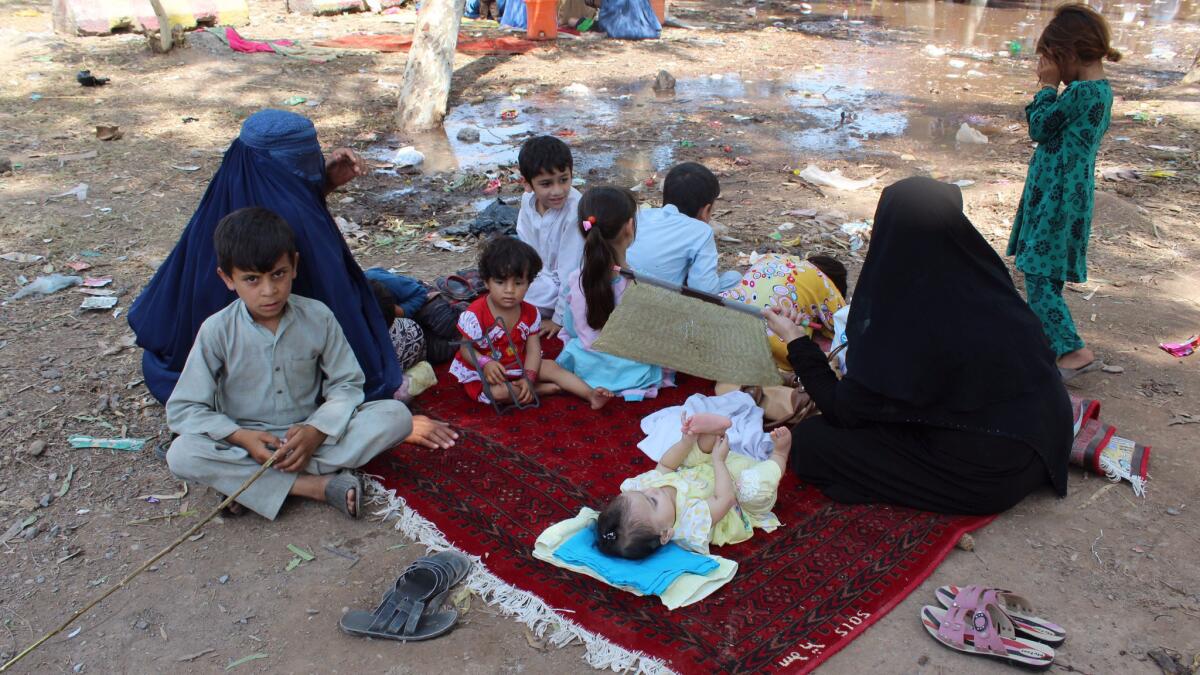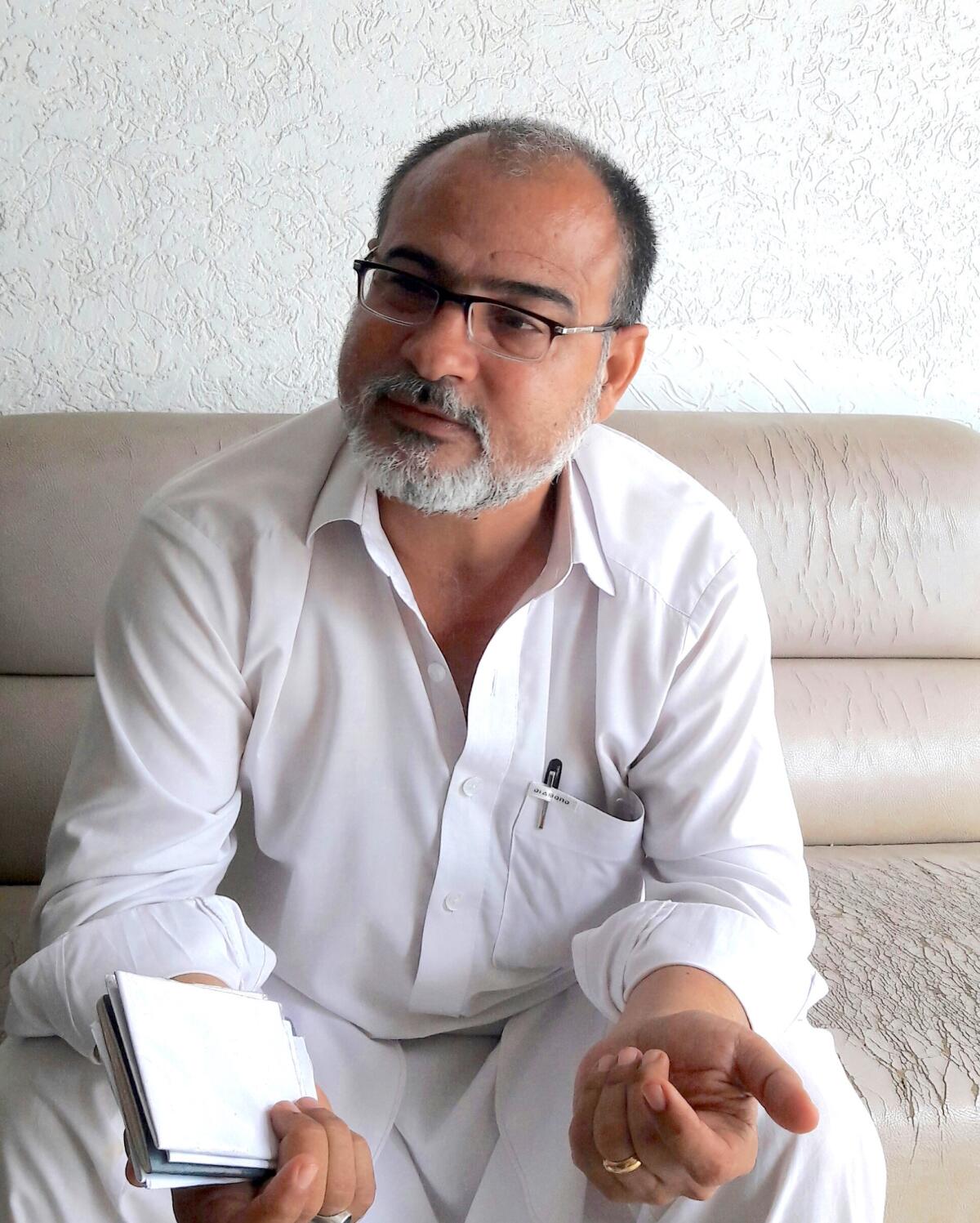Afghan refugees in Pakistan forced to leave the country in response to get-tough measures

- Share via
Reporting from Peshawar, Pakistan — Muhammad Aslam inhabits what he describes as an absence of place.
Aslam migrated from Afghanistan to Pakistan as a teenager in 1981 after the Soviet invasion of his country. He got an education, becoming a doctor in the northern city of Peshawar, married and had a family.
One of millions of Afghans scattered by waves of civil war spanning more than three decades, Aslam made a life in his adopted country with every intention of staying.
Now he and others may be forced to go back to Afghanistan, a country in turmoil and one they know little about, because Pakistani officials are describing Afghans as a security and economic threat at a time of worsening militant violence.
“It’s like becoming a refugee again,” Aslam, 49, said recently in an interview.

Pakistan has announced that the 1.5 million registered Afghan refugees in the country must leave by Dec. 31 as part of get-tough measures to combat terrorism, fueling fresh fear and uncertainty among families who have spent almost their entire lives in their adopted country.
An estimated 1 million other Afghan refugees are in Pakistan without papers and facing expulsion. Provincial police say that 8,000 Afghans in the country illegally have been arrested in the last three months.
In practice, Afghans cannot gain citizenship in Pakistan; they are only given Proof of Registration cards. Pakistan says those cards will expire at the end of the year.
As the deadline approaches, Afghans are descending in throngs on the United Nations refugee agency’s repatriation center on the outskirts of Peshawar as they head back to Afghanistan.
Pakistan has threatened to evict Afghans before, most recently in 2013, only to extend the deadline under international pressure. A relatively small number of Afghans returned home that year.
Meanwhile, Afghanistan is sliding deeper into political turmoil, with Taliban insurgents threatening to seize major cities and more than 1 million people internally displaced by conflict. Many Afghans are becoming new refugees as they leave the country in their greatest numbers since the 2001 U.S.-led invasion.
The Afghan government has launched a campaign encouraging refugees to return and help rebuild, but many say the country is not ready to absorb large numbers of returnees who would require shelter, education, healthcare, food, jobs and other basic needs.
“Life in Kabul does not hold any attraction for me,” said Aslam, sitting on a couch at a real estate office where he had gone to give notice that he was vacating his rented house. “I don’t see any future for my children there. Why am I forced to go back to a country which has no future except blood bath?”
Aslam’s eyes grew misty as he recalled his life in Peshawar, where he has spent the last 35 years. In anticipation of leaving, he sold his carpets and other household goods and closed up his medical clinic.
But he worried about his teenage daughter who is confined to a wheelchair because of spinal cord injuries suffered in a road accident. He has three other children.
“At least I feel safe in Peshawar, and my children have an opportunity to get quality education and healthcare,” Aslam said.
Under a 20-point National Action Plan, launched after a December 2014 militant attack on an army-run school in Peshawar that killed 144 students and teachers, Pakistan instituted a host of anti-terrorism measures. Among them was a plan to seal its border with Afghanistan and repatriate Afghan refugees.
Abdul Qadir Baloch, Pakistan’s federal minister for the Afghan border region, said in June that more than 1 million Afghan refugees were working in Pakistan and taking jobs from Pakistanis. He accused Afghans of “hurting the … culture” of Pakistan’s Khyber Pakhtunkhwa province and “involvement in crimes.”
Until June, when Pakistan imposed its new measures, Afghans could enter the country without visas. Pakistanis need visas to enter Afghanistan.
The Afghan government said last week’s attack at the American University of Afghanistan in which militants killed 13 people was plotted in Pakistan. Pakistan, for its part, closed a border crossing in its province of Baluchistan after a mob on the Afghan side burned a Pakistani flag.
Human Rights Watch, the New York-based watchdog group, has accused Pakistani police of “an unofficial policy of punitive retribution against Afghans” including house raids, arbitrary arrests, harassment, extortion and demolition of residences.
The U.N. repatriation center in Peshawar is overcrowded with a rush of departing Afghans who have loaded their household items on trucks and are waiting several days in searing heat to have their documents verified.
Several Afghans at the center last week complained about a lack of drinking water, bathrooms or waiting areas for women. Mothers held their children close to their chests to protect them from the sun. Families slept under the sky along a main road.
“Treat us like human beings,” Muhammad Karim, who was returning to Afghanistan after living in Pakistan’s Punjab province for 30 years, said in an interview. “Provide us temporary shelter and drinking water. Our children will die due to hot weather.”
The U.N. – which said about 70,000 registered refugees had returned to Afghanistan since July – announced it was opening another center near Peshawar to speed up the process. The U.N. is expected to provide each refugee with assistance once they are in Afghanistan.
Many Afghans were returning despite fears that they could be targeted in Kabul, the Afghan capital, as suspected agents of Pakistani intelligence.
“I don’t think the Afghan government has the capacity and resources to take in this huge load,” Shamim Shahid, a journalist in Peshawar who covers Afghanistan, said in an interview. “It can result in a big human catastrophe.”
Syed Hussain Shaheed Soherwordi, an international relations professor at the University of Peshawar, said the forced return of refugees would further strain relations between the countries.
Soherwordi said one reason for Pakistan’s tougher policy was retribution for Afghanistan’s growing relationship with India, Pakistan’s blood rival. India and Afghanistan have strengthened their ties since Afghan President Ashraf Ghani took office in 2014.
After the recent unrest at the border, Soherwordi said, “Pakistani authorities believe that [Afghans] are becoming our enemies.”
Ali is a special correspondent. Times staff writer Shashank Bengali in Mumbai, India, contributed to this report.
More to Read
Sign up for Essential California
The most important California stories and recommendations in your inbox every morning.
You may occasionally receive promotional content from the Los Angeles Times.










